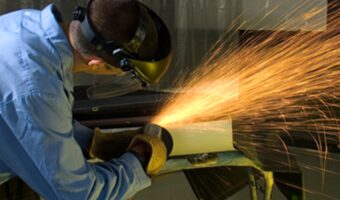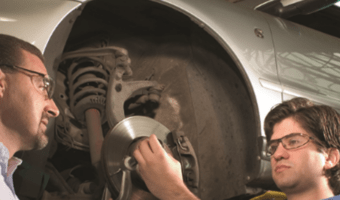Program Overview
Our Associate in Science in Automotive Technology degree will provide you with the theory of operation, design, and servicing techniques of the many systems and system components of today’s automobiles.
The New England Institute of Technology’s (NEIT) automotive technology associate degree exposes students to the latest industry standards, up-to-date diagnostic equipment, and an Automotive Service Excellence (ASE) approved curriculum in its training program.
The associate degree in automotive technology is Master Certified by the National Automotive Technician’s Education Foundation (NATEF).
Some of the things you will learn with an expert during the degree in automotive technology are performing routine service and maintenance of vehicles, brake systems, electrical circuits, engine performance, steering systems, suspension, and more.
Work in state-of-the-art labs on real-life diagnostic situations, test and resolve malfunctions using the most modern equipment and software, and work alongside an experienced faculty. Such experiences and skills help you land a high-demand job in the industry after graduation.
After graduation, you can continue for a bachelor’s degree in Business Management with an Automotive Service/Transportation Management concentration.
Read More The Automotive Technology Department at NEIT provides in-depth study and application of the most current trends in the automotive field. The department offers four automotive associate degree programs: While the basic structure of the two programs is similar, the advanced programs cover the automotive technology field concepts in greater depth. Students learn the design, theory of operation, and servicing techniques of the many systems and system components of modern automobiles. They train in engine construction and design, engine repair, electricity, electronics, suspension, steering, brakes, transmissions, fuel systems, ignition systems, and emission controls for maximum learning. Additionally, students get general education and training on air conditioning, drive trains, and transaxles. The engine performance course covers computerized engine controls, fuel injection systems, tailpipe emissions diagnosis, and ABS braking systems. NEIT uses the latest industry standards, up-to-date diagnostic equipment, and an ASE-approved curriculum in its training program. NEIT participates in the following programs for on-ground experience for the students: These intensive programs prepare students for entry-to-industry-level technical capability and offer skills needed for rapid advancement. Graduates of this program are eligible to continue for a Bachelor of Science Degree in Business Management with an Automotive Service/Transportation Management (MGTT) concentration. Job Outlook in Rhode Island According to the Bureau of Labor Statistics (BLS), the total number of automotive service technician and mechanic jobs in 2020 was 703,800. It is set to grow by 2,100 over the next decade. As of May 2021, Rhode Island employed 2,510 automotive service technicians and mechanics. Connecticut and Massachusetts employed 7,670 and 12,610 automotive service technicians and mechanics, respectively. The NEIT campus that offers the automotive technician associate program is the Access Road Campus, located at 110 Access Rd #65, Warwick, RI 02886. Rhode Island does not require automobile mechanics to hold a license to service and maintain vehicles. However, those who match these standards have higher career opportunities: The median pay for automotive service technicians and mechanics was $46,880 ($22.54 per hour) in 2021, making automotive technology a very rewarding career choice. Rhode Island had an annual mean wage of $48,380. The neighboring states of Connecticut and Massachusetts had mean yearly wages of $50,550 and $53,340, respectively. ACCREDITATION STATUS NEIT’s Automotive Technology program has received Master Automobile Service Technology Accreditation by the ASE Education Foundation, 1503 Edwards Ferry Rd., NE, Suite 401, Leesburg, VA 20176, (703) 669-6650 ● www.ASEeducationfoundation.orgFull Description
After graduation, students fulfill the requirements for the Ford MLR certification.
The LOCAL curriculum has two levels:
NEIT Campus that Offers the Associates Degree in Automotive Technology
License Requirements in Rhode Island
Salary Data
Potential Career Opportunities
The automotive industry continues to expand, with several exciting positions opening up often. Graduates can find work as:
Automotive Service Technician
Automotive Technician
Auto Mechanic
Automotive Parts Specialist
Glass Repairer
Distribution Manager
Shop Foreman
FAQ
-
Is automotive technology a good career?
Automotive service can lead to a promising career path, from repair workers, shop mechanics and more. The industry remains especially appealing for individuals who enjoy working with their hands and exercising their problem-solving abilities.
-
What is automotive technology?
The term refers to the study of the mechanics and technologies propelling today’s moving vehicles. Certificate programs, associate degree programs and other college programs in automotive engineering technology typically focus on service and maintenance, heavy equipment, mechanical design, collision repair, safety facilities, heating and cooling systems, software solutions, and more.
-
What is a technical associate’s degree?
A technical associate’s degree provides students with the academic education and technical skills needed for work in the field. NEIT fulfills this requirement by offering students both classroom learning and lab instruction.
-
What Individual Qualities Do I Need to Become an Automotive Technician?
Apart from the necessary education, you need these skills to succeed as an automotive technician:
- Attention to detail – Car or truck mechanics must be detail-oriented while diagnosing the problem before repairing or servicing.
- Ability to diagnose – The technician should have the troubleshooting skills to detect problems with electrical systems, mechanical systems, wear-related issues, etc. Automotive technology students usually discover and fix issues during studies and on-the-job training.
Good customer service – The best service technicians develop good personal relations with clients. While many technicians overlook this quality, it goes a long way in building connections and gaining trust.



